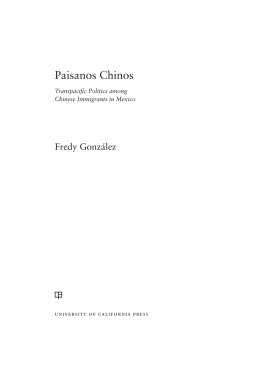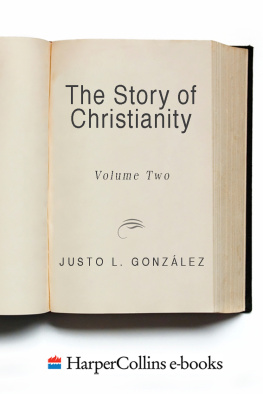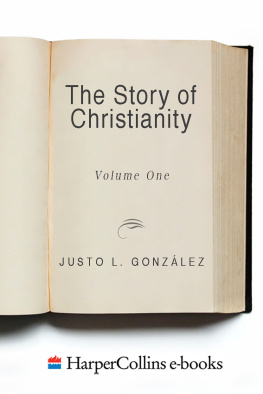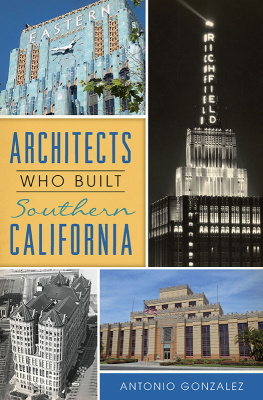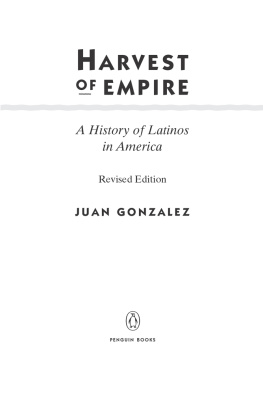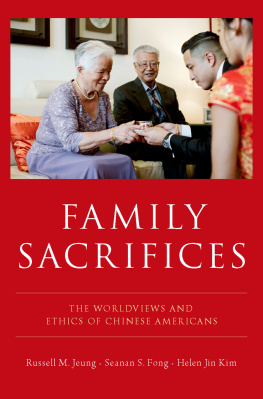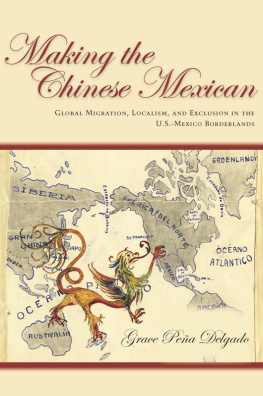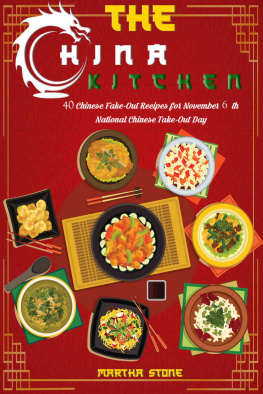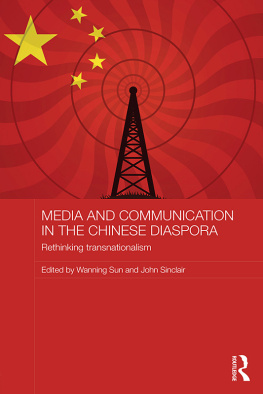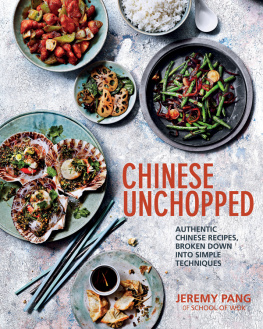Acknowledgments
I am incredibly grateful to Chinese Mexicans for their help and support, particularly Monica Cinco Basurto and Ignacio Chiu. They and their group Inmigraciones Chinas a Mxico have served as an important vehicle for preserving the communitys history, including a conference dedicated to Chinese Mexican history and a commemoration of the 1960 repatriation of Chinese Mexicans. Monica was truly an inspiration, having done so much not only for me but also for other scholars who work on the history of Chinese Mexicans. Despite the fact that I was a community outsider, both were incredibly welcoming and supportive, and their thoughts helped improve parts of this book and made me think about Chinese Mexican history in a more complete way. I also received considerable assistance from Cristina Jolie Lau, Mariana Ming Sze Cheng Leung, and Pilar Chen.
Sources for this project are scattered across several archives in five countries, and thus I am incredibly grateful to the librarians and archivists who helped me quickly and efficiently find the documentation I needed. This especially included the archivists at the Archivo General de la Nacin and the Acervo Histrico Diplomtico de la Secretara de Relaciones Exteriores (Mexico) and Academia Historica and the Institute of Modern History at Academia Sinica (Taiwan). I am also grateful for the pools of funding that made this project possible. A Richard U. Light fellowship from Yale provided language training in Beijing and Harbin, while funding was also provided by Yales Council on East Asian Studies and Fox Fellowship. An IIE Graduate Fellowship for International Study allowed me to conduct research in Mexico. At the University of Colorado, I received funding from the A&S Fund for Excellence, IMPART, GCAH, and the Hazel Barnes Flat. Part of chapter 2 was first published as Chinese Dragon and Eagle of Anhuac: The Local, National, and International Implications of the Ensenada Anti-Chinese Campaign of 1934, Western Historical Quarterly 44, no. 1 (2013): 4868.
Kate Marshall and Bradley Depew at University of California Press have truly been a joy to work with, quickly and efficiently moving the project forward from advance contract to publication. Many thanks to the scholars who provided careful and thorough feedback on the manuscriptincluding Erika Lee, Evelyn Hu-DeHart, Jason Chang, and two anonymous readers. Their support and helpful criticism helped me refine the argument of the book, be more assertive, and consider its true significance. Roger Waldingers NEH Summer Seminar encouraged me to think about wider migratory trends, and I appreciate the useful questions posed by members of the seminar. Thanks also to the friends and colleagues who work on Asians in the Americas, including Julia Maria Schiavone Camacho, Jason Chang, Ana Mara Candela, and Kathleen Lpez.
The University of Colorado has been a wonderful place to work, supporting my research and conference travel to several countries. Several colleagues generously spent a considerable amount of time reading multiple chapter drafts and pushing me to refine my ideas. Elizabeth Fenn was an amazing chair who spent so much time supporting my work at Colorado and never failed to provide encouragement and advice. My brilliant friend and colleague Miriam Kingsberg read the entire manuscript and provided feedback. Elissa Guralnick provided amazingly insightful editing on three chapters during her Well Argued? Well Written! seminars. The Department of Historys Junior Faculty Reading GroupMithi Mukherjee, Marjorie McIntosh, Cline Dauverd, John Willis, Kwangmin Kim, Liora Halperin, Sungyun Lim and Samanthis Smallsgenerously discussed several drafts and didnt mince words when they had questions or concerns. Many thanks to the rest of the history department who took time out of their busy schedules to provide advice, answer questions, and offer encouragement and congratulations (often over a coffee or beer).
My friends from graduate school are now scattered across the globe, but it has been a joy to see them at conferences and at joyful occasions. Andre Deckrow wrote a review of my dissertation and provided helpful feedback. Romeo Guzmn often dropped everything to read a last-minute chapter or article draft, for which Im incredibly grateful. Lisa Ubelaker Andrade and Marian Schlotterbeck helped me set clear goals as we met week after week with the target of publishing our work. Gil Joseph has continued to be a wonderful mentor even years after graduation, taking time to strategize with me and write letters on my behalf.
Its overwhelming to think about the incredible kindness that people showed me in the course of this project. Several people graciously opened their homes to me either repeatedly or over an extended period of time, or took time to show me around the city or even the island. They took a deep breath and explained things again in simpler Chinese and Spanish. They told me my work was interesting even when it wasnt. They pointed out helpful archives and resources and introduced me to gatekeepers who made all the difference. Others took me under their wing without knowing much about me and invited me to participate in conferences and symposia, or introduced me to editors. I didnt deserve any of this and thus feel incredibly grateful. I particularly would like to thank Xander Woolverton and Marie Barnett, J.C. Kollmorgen, Javier Prez Espinoza and Rogelio Maya, Stone and Carol Chen, Austin Paichun Cheng, Benjamin Paske, Nancy and Norma Gonzlez Gmez, Peter Liu Hanzhong, and the Cai family.

